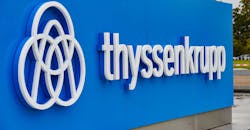Kone CEO Wants Full Merger With Thyssenkrupp Elevator Unit
Kone Oyj’s Chief Executive Officer Henrik Ehrnrooth wants a full merger with Thyssenkrupp AG’s elevator unit, as the Finnish firm prepares a bid for its German rival’s crown jewel that could thwart interest from private equity.
Ehrnrooth would like Thyssenkrupp to be a major shareholder in the combined entity, he said in an interview with Bloomberg News in Helsinki. He sees significant synergies from a merger and believes potential antitrust hurdles that make the German firm’s management cautious about a deal can be overcome.
“The complementary fit of these two companies is just second to none,” Ehrnrooth said. “Clearly, we would welcome Thyssenkrupp as an owner in this new entity and that way share the long-term benefits with us.”
Thyssenkrupp shares gained on the news and were up about 2.5% at 1:40 p.m. in Frankfurt, while Kone was down 0.4% in Helsinki.
Crisis-hit Thyssenkrupp is preparing to sell a stake or list some of the elevator unit to raise much-needed cash. Potential suitors for the division, a high-margin business that’s profiting from a global mega-trend of urbanization, include rivals like Kone and around 10 private equity firms.
Thyssenkrupp CEO Guido Kerkhoff has signaled to private equity bidders that he would prefer to sell a minority stake in the elevator unit to them. That way, the company could retain some control and swerve the kind of issues with competition regulations that torpedoed the planned steel joint venture with Tata Steel Ltd.
Important Topic
“We have looked at a lot of scenarios and we think that it is doable,” Ehrnrooth said of possible antitrust concerns. “We understand that this is an important topic for Thyssenkrupp.”
Ehrnrooth said the geographical spread of the two companies makes the deal particularly attractive to Kone.
The Finnish firm generated 2018 sales of more than 9 billion euros ($10 billion), with 42% of those in Europe, 38% in the Asia-Pacific region and 20% in the Americas. Thyssenkrupp elevator had sales of over 7 billion euros, with 27% in Europe, 4% in the Middle East and North Africa region, 29% in Asia Pacific, 5% in South America and 35% in North America, according to a company fact sheet.
“It’s this geographic footprint, what synergies we can create and how we can bring, on a much broader scale, these benefits to our customers,” Ehrnrooth said.
Several investment firms will start making proposals next week, with elevator companies likely to follow, people familiar with the matter said last week.
Maintaining a stake in the business would enable Thyssenkrupp to benefit from future revenues, helping it shore up a balance sheet weakened by pension deficits, rising debt and lower revenues due to Germany’s auto sector slowdown.
The re-appointment of Margrethe Vestager as the European Union’s antitrust chief will likely have increased Kerkhoff’s reluctance to pursue a merger with a strategic rival. The two clashed over the steel joint-venture decision, with Thyssenkrupp lodging a legal complaint against the commission’s rulings.
Kerkhoff previously planned an initial public offering of the elevator unit. The parent company’s worsening financial performance has forced him to look at a partial or full sale, which could fetch a higher price and bring in cash sooner.
About the Author
Bloomberg
Licensed content from Bloomberg, copyright 2016.
